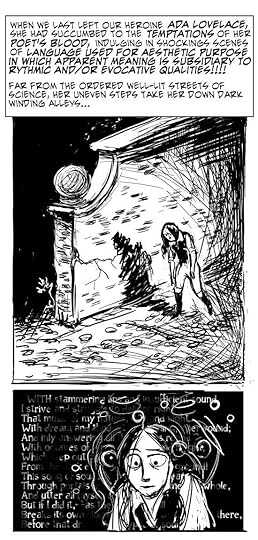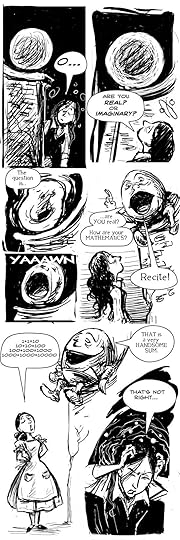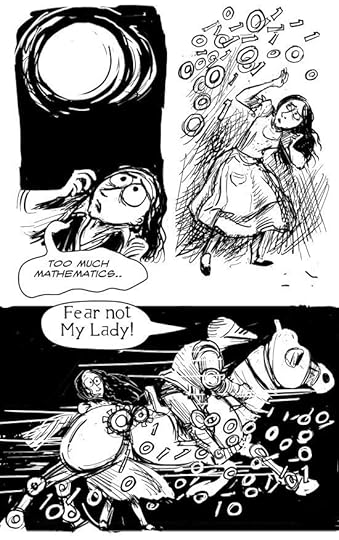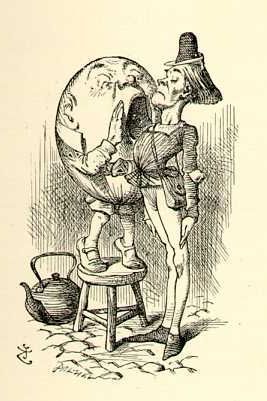Lovelace and Babbage vs The Organist, pt 5
This is a totally self-indulgent episode that has nothing to do with anything.








What's the use of Pictures and Conversations without NOTES?
This episode is dedicated to Martin Gardner's Annotated Alice, which I read until it fell apart; more recently I've been hugely enjoying Lewis Carroll in Numberland, a highly recommend little book, from whence this episode has sprung.
Through the Looking Glass (And What Alice Found There) was published in 1871, the year of Babbage's death, and much too late for Lovelace who would have loved it I think. Charles Babbage, I am THRILLED to report, did once meet Lewis Carroll, in 1867:
"Then I called on Mr. Babbage, to ask whether any of his calculating machines are to be had. I find they are not. He received me most kindly, and I spent a very pleasant three-quarters of an hour with him, while he showed me over his workshops etc."
I have to wonder if Charles Dodgson (as we should call his name, in his Mathematical Incarnation) is kidding here; it seems impossible to me that he didn't know the most famous thing about the Engines being that they didn't exist. How sad that they didn't have a longer acquaintance!
It's even sadder that he never met Lovelace- he would have been about 20 when she died, and there's more than a touch of the kindred spirit there; at least so it seems to me. Their 'voices' at least sound very similar– here's Lovelace for instance, writing to her informal tutor August de Morgan:
Dear Mr De Morgan-
I may remark that the curious transformations many formulae can undergo, the unsuspected & to a beginner apparently impossible identity of forms exceedingly dissimilar at first sight, is I think one of the chief difficulties in the early part of mathematical studies. I am often reminded of certain sprites & fairies one reads of, who are at one's elbows in one shape now, & the next minute in a form most dissimilar; and uncommonly deceptive, troublesome & tantalising are the mathematical sprites & fairies sometimes; like the types I have found for the in works of Fiction..
and Dodgson, on trying to find a proof–
"Like the goblin 'Puck', it has led me "up and down, up and down," through many a wakeful night: but always, just as I thought I had it, some unforeseen fallacy was sure to trip me up, and the tricksy sprite would "leap out, laughing, ho ho ho!""
Lovelace and Dodgson both loved Euclid (Lovelace: "It is a very pretty little Theorem– so neat and tidy! the various parts dovetail so nicely!") and the emerging field of symbolic logic, and both stumbled through the Nameless Wood of calculus– Lovelace wrote to De Morgan "these Functional Equations are complete Will-o-the-wisps to me', and Dodgson, after four years (!) of studying Mathematics at Oxford and despite coming at the top of his class, writes "talked over the Calculus of Variations with Price today; I see no prospect of understanding the subject at all." You may need to recalibrate your judgements of people's math by the way– Carroll was already lecturing in mathematics at Oxford when he described the end of Differential Calculus as 'new to me' as late as the 1850s!
Look at me, rambling on.. MORE NOTES!
–Zero, a subject fascinating to 'non-mathematical minds' I have been informed, is both real and imaginary– Leibniz calls it "a fine and wonderful refuge of the divine spirit – almost an amphibian between being and non-being."
–Lovelace's sums are correct if done in binary.
–A gloriously simple and clever binary counter
–A handsome Rube-Golbergian binary adding machine.
–For a truly awesome introduction to the history of binary, I refer you to this concise paper with loads of interesting docs (PDF), including this lovely passage from Liebniz:
One of the main points of the Christian Faith, and among those points that have penetrated least into the minds of the worldly-wise and that are difficult to make with the heathen is the creation of all things out of nothing through God's omnipotence, it might be said that nothing is a better analogy to, or even demonstration of such creation than the origin of numbers as here represented, using only unity and zero or nothing.
I love the bit about publishing this discovery in the form of a large medal.. talk about cumbersome notation!
– `Too much mathematics!" — Here is an Alice-in-Wonderland conundrum for you: as we all know, Lovelace's mother attempted to curtail the inherited Poetical Disorder of Ada's mind through rigorous mathematical study. On the other hand, her tutor Augustus de Morgan worried about the well-known fact that studying mathematics damaged women's brains, as he expressed in this extraordinary letter to Lovelace's mother. If she did NOT go mad through not ENOUGH mathematics, she was bound to go mad by studying TOO MUCH. It's heartbreaking to read the letter to De Morgan's wife Sophia that I quoted in the last episode–
"There has been no end to the manias & whims I have been subject to, & which nothing but the most resolute determination on my part could have mastered. The disorder had been a Hydra-headed monster; — no sooner vanquished in one shape, than it has sprung up in another.[…] Many causes have contributed to the past derangement; & I shall in future avoid them. One ingredient, (but only one among many) had been too much Mathematics."
Yikes. Anyways, to happier subjects–
– It was Lovelace, not Babbage, who invented a steam-powered horse, but as she was 13 at the time she was unable to secure government funding.
– Charles Babbage's horsemanship cannot be accurately assessed from the available documents, except for the unbearably awesome fact that Ada Lovelace lent Babbage a freaking' pony when he used to visit her estate: "You can have a pony all to yourself, and never have to walk a step except on the terrace, the 'Philosopher's Walk'" (1849-ish) I want a pony.
– Lovelace to Babbage, 1848, re his TicTacToe machine: "You say nothing of Tic-tac-toe– in yr. last. I am alarmed lest it should never be accomplished. I want you to complete something; especially if the something is likely to produce silver & golden somethings.." :D
–The delightful image of Ada as Alice and Babbage as The White Knight, which only becomes more apt the more I think about it, is not mine–it's throwaway line of Lovelace's first biographer Doris Langley Moore. I'd criticise Moore's bio but I'm afraid she'd slice me in half with a microscopic lift of one perfectly groomed eyebrow. I'd criticise all the rest of the bios but I'm too chicken to do that too; at least, I'm waiting until I can do it without being really fighty and unpleasant. Instead, I'll stick to passive-aggressive digs! Soon I shall sink to writing mean reviews on Amazon under a pseudonym, instead of the approved method of elaborately sarcastic letters to the Times Literary Supplement that commence: SIR–
Anyways!! Seriously I could have done Alice episodes forever but I promise, next episode MONKEYS! COFFEE! EVIL SCHEMES! POSSIBLY EVEN A MUSICAL NUMBER!
PS- small query– how is the size of the comic working for you? Too big? To small? How about the size of the text? It's hard to tell what the best size is, right now I'm doing them 550 px wide with 14 pt text but that seems a bit big.. opinions?




